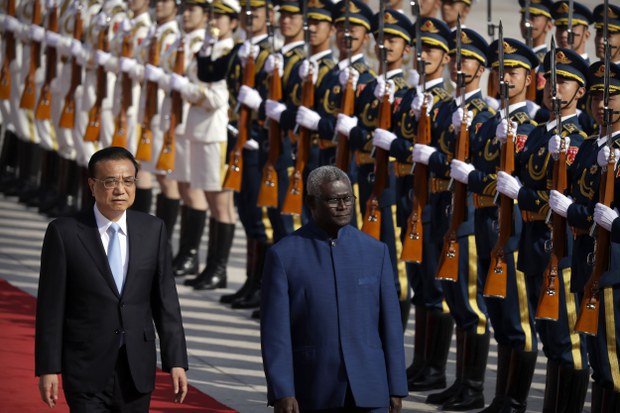China’s focus on remote Pacific islands offers gains and heightened US rivalry
Share

Chinese Premier Li Keqiang, left, and Solomon Islands Prime Minister Manasseh Sogavare review an honor guard during a welcome ceremony at the Great Hall of the People in Beijing, Wednesday, Oct. 9, 2019.
China’s security pact with the Solomon Islands has highlighted diplomatic gains made over two decades in a vast Pacific region neglected by the United States.
The remote Pacific Island countries, small in population and lacking in economic clout, might not seem an obvious choice for China to influence, but both sides have benefited.
China has become an important and welcome source of loans, infrastructure and aid for the region, which struggles to get finance and is frequently battered by natural disasters. For Beijing’s part, it has further isolated Taiwan internationally by flipping some of its Pacific allies and has potentially secured supportive voices in international institutions. It has gained access to fisheries and mineral resources and has also inched closer to establishing a military presence in the region.
Taiwan, which Beijing views as a rebellious province, explains much of China’s interest in the region, said Sandra Tarte, an international politics expert at the University of the South Pacific. “Countering Taiwan has been a key thing,” she said. “That has always been the driver of China here in the Pacific.”
The Solomon Islands and Kiribati switched their diplomatic recognition to Beijing from Taiwan in 2019, a victory in renewed Chinese government efforts to whittle away Taiwan’s few remaining allies and pressure it into reunification. Taiwan is now recognized by just 14 countries, including four Pacific Island states.
As it built its influence, China has pressured the Pacific Islands Forum, an important regional institution, to adopt its One China policy, but without success so far.
China’s pact with the Solomon Islands, signed in April, allowing it to send security forces to protect its economic interests has renewed concerns it seeks a military outpost in the region. But Beijing’s efforts to get 10 Pacific nations to also sign a broad agreement that would shape relations was rebuffed. Several Pacific leaders have said they would not welcome a challenge to U.S. military dominance.
Some experts say the vulnerability of Pacific nations has made them a potentially high-reward strategic investment for China’s government as it pursues its Taiwan aims and other goals such as blunting U.S. projection of military power in Asia and the Pacific.
Lack of economic development and perceptions in Pacific capitals of neglect by the United States and its allies created a void that China has filled with investment, loans and high-level diplomacy, former diplomats and other experts said in a United States Institute of Peace report, released this week.
“Perhaps to a greater extent than any other geographic area, the Pacific Islands offer China a low-investment, high-reward opportunity to score symbolic, strategic, and tactical victories in pursuit of its global agenda,” the report from the congressionally funded research institute said.
Pacific countries’ own agendas also have drawn China’s involvement. Fiji, among the most populous of the Pacific Island nations, courted relations with China and countries such as India and Russia after New Zealand and Australia sought to punish it for a 2006 coup.
“There was a convergence of interests with China,” said Tarte. “For Fiji, China was there as a political ally as well as an economic partner and security partner.”
Ralph Regenvanu, a Vanuatu lawmaker, has said it is easier to get China’s assistance for big ticket projects such as infrastructure compared with the more stringent requirements of other countries.
Some analysts date the start of heightened Chinese interest in the Pacific Islands to its 2006 economic development and cooperation forum in Fiji. China’s President Xi Jinping attended summits in the region twice in the past decade.
U.S. involvement in the region began to diminish after the breakup of the Soviet Union. In the past two decades Washington has been preoccupied with conflicts in the Middle East.
The U.S. and allies such as Australia and New Zealand have been overtly responding to China’s increased influence in the Pacific since about 2018. The recent flurry of Western and Chinese diplomatic activity in the region partly reflects that the COVID-19 pandemic that shut down travel for two years has faded and face-to-face meetings can take place again.
BenarNews, an RFA-affiliated news service.







